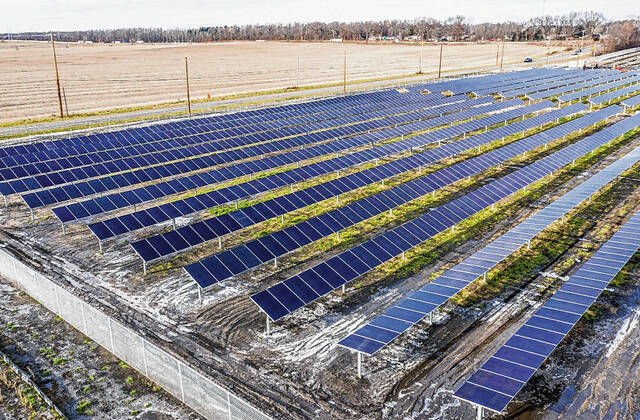Local planners are working on establishing planning and zoning regulations governing the placement of “solar farms” in Bartholomew County. That’s a good step forward.
As The Republic’s Mark Webber reported last week, the state legislature has tried in recent years to pass a one-size-fits-all set of solar farm regulations for all 92 of Indiana’s counties — a move Bartholomew County officials have opposed. What might work out near Huntington might not go over so well over by Hope, and that’s even assuming the General Assembly could ever agree on what statewide regulations should look like.
So the county is looking forward responsibly in the meantime to try to establish standards for how and where solar farms may be placed. This would set the criteria required to permit responsible development while also addressing concerns that some opponents of solar farms have expressed, particularly regarding property line setbacks.
What regulations cannot and should not do, however, is create a process so onerous that they would effectively “zone out” solar farms, potentially depriving landowners of the use of their property for solar generation should they choose to do so.
We understand some opponents would view the very presence of a solar farm as a blight upon the landscape and a depravation of fertile farmland. They’re entitled to that view, but we don’t see it that way.
We believe landowners are entitled to use their land as they see fit within the law and within land use regulations, so long as that use doesn’t harm neighboring properties. There may even be some hybrid models in which farming takes place alongside large-scale solar farms on the same property.
This is a difficult tightrope to walk, but any proposed regulations will be subject to public hearings before they are adopted. Also, Webber reported, “With or without ordinance changes, any developer who wants a conditional use permit for a solar power installation will have to go before the Board of Zoning Appeals, where a public hearing must be held,” according to Columbus-Bartholomew County Planning Department Director Jeff Bergman.
So any and all potential solar farm developments would still be reviewed on a case-by-case basis, and neighboring property owners would be notified of any hearings on proposed solar farms, as the law requires.
What clear regulations can do is set expectations for the community and for any landowner who might be thinking about switching from cultivating corn and soybeans to cultivating green energy.
There has to be a middle ground on this issue. We need abundant green energy now and we’ll need it even more in the future. Solar farms alone aren’t the total solution to our energy needs, but as we’ve seen just since Vladimir Putin started a senseless war in Ukraine that endangered world oil supplies, we need as many reliable, homegrown energy resources as we can harness.
It’s been demonstrated repeatedly across the country that using land for solar energy is good stewardship that can work in tandem with agriculture. A few farmers here and there in Bartholomew County may decide solar farming is what they want to do with their land.
They have that right as property owners, as long as they abide by the rules.





